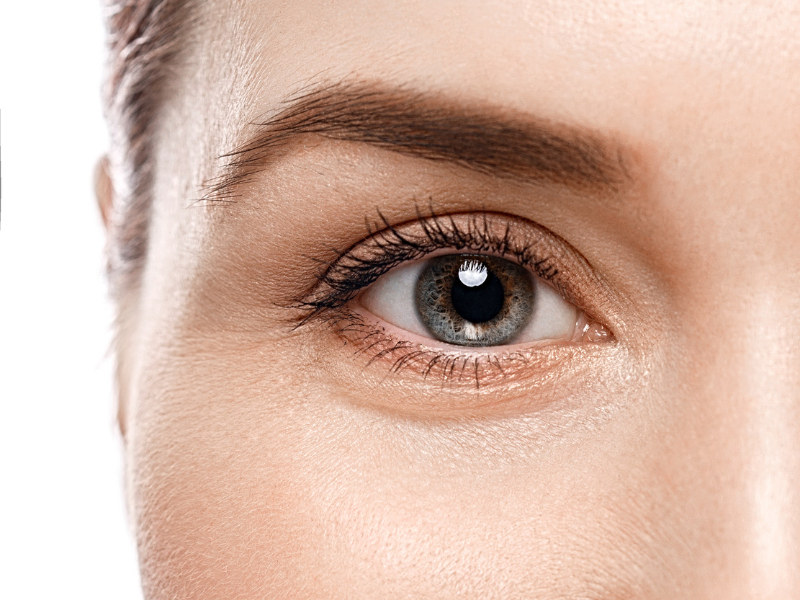
Herpes in the eye
Herpes is a well-known condition both in Denmark and the rest of the world, and the contagious virus is quite common among the population. In fact, studies show that up to 80% of Danes are infected with herpes, but far from everyone notices the virus throughout their lives.
Herpes is best known for causing cold sores on the lips, but that's not the only place you can get outbreaks . The virus can appear in many different places on the body, so it's also possible to get herpes in the mouth, on the body, and in the eyes.
QUR Herpes Gel
Buy your herpes cream here - Effective and discreet treatment of herpes 1 & 2
Buy here!
Can you get herpes in the eye?
You can get herpes in your eye, and the infection is called herpes keratitis in the medical language. Normally, herpes simplex appears as small blisters on the skin, which turn into ulcers when the blisters burst. However, when it comes to herpes in the eyes, the symptoms will often appear in a different way, which you can read more about below.
Herpes stays in your body for life, but you may not notice anything significant about the virus. It goes dormant, and 80% of those infected never notice anything about the virus, while the unfortunate last 20% will experience outbreaks at different intervals throughout most of their lives . You don't know which factors determine which group you will belong to, and therefore there is not much you can do.
Who among the last 20% will have many outbreaks is not determined in advance. However, there are a number of factors that play a role when it comes to the risk of having an outbreak. These include factors such as a weakened immune system, stress, menstruation and heavy exposure to sunlight. These factors are known to provoke an outbreak of herpes.
What is herpes keratitis?
Herpes keratitis means inflammation of the cornea of the eye and is also known as keratitis . The inflammation is caused by the herpes simplex virus in the eye, and when it breaks out it will cause various symptoms. First of all, herpes in the eye causes inflammation of the cornea. In addition, the eyelids, conjunctiva, iris and retina can also be affected, which can cause pain and redness of the eyes and blurred vision.
Herpes keratitis is transmitted in the same way as other forms of herpes. If you have herpes in your eye, it is often transmitted through tear fluid. So in all cases, you should be very careful to wash your hands often and avoid touching the area of skin/eyes that has herpes outbreaks.
How is herpes transmitted in the eye?
When we look at herpes in general, the virus is transmitted through skin contact or mucous membrane contact. But how do you get herpes in the eye? With herpes in the eye, it is often tear fluid that poses a risk of infection, and this is especially true when there is a herpes outbreak. If instead it is herpes on the skin next to the eye, it will typically be through skin contact that the virus is transmitted.
What does keratitis feel like?
Herpes in one or both eyes is in most cases not a serious condition, but it can develop to the point where your vision is at risk. Therefore, it is important that you see a doctor if you experience symptoms like those described below. Most cases resolve on their own after a while, but you need to be extra careful so that the disease does not develop.
The typical symptoms of herpes in the eye are photophobia and squinting. In addition, the virus can cause increased tearing, decreased vision, and pain and redness in the eye.
You may experience reduced vision because the virus enters and affects central vision. Typically, it will only be experienced in one eye. The cause is the small wounds that occur on the cornea during inflammation.
If you experience an outbreak of the virus in your eye, don't worry about a large cold sore in your eye. This is not the case, but instead you will get tiny sores that you cannot see.
Herpes in the eye treatment
Fortunately, there is a way to treat herpes in the eyes, a so-called herpes keratitis treatment. Most often, the treatment takes place in an eye department, where the infection is stopped and the inflammation is reduced. Typically, an eye ointment and/or eye drops are used to provide relief.
In more severe cases, the damaged cells may need to be removed. This is done under local anesthesia with eye drops, after which the doctor can remove them. In rare cases, surgery may be necessary to remove cloudiness on the cornea.
For people who experience frequent cases of keratitis, preventive treatment may be necessary. This is something you decide together with a specialist.
Can you get herpes on your eyelid?
There is not only a risk of herpes virus in the eye. You can also risk getting herpes under the eye or herpes by the eye. Here you will not necessarily get keratitis, as this is located in the cornea itself. Instead, many people experience cold sores around the eye. This will appear as small blisters, which herpes is well known for. They will subsequently turn into a cold sore by the eye.
Herpes around the eyes can be treated with a prescription cream from your doctor. You can also choose over-the-counter remedies that prevent and relieve symptoms. It is important to note that herpes cannot be cured, but can only be treated, and treatment can shorten the period of outbreaks.
Can I get herpes zoster in my eye?
Herpes zoster is another type of herpes virus, also known as shingles. And as the name suggests, it is a form of herpes that can be very painful. Typically, herpes zoster causes a rash over parts or all of the body and can also occur in the eye. Another name for this is zoster ophthalmicus , which occurs as an inflammation of some of the many sensory nerves that go to your eye.
The typical symptoms are a tingling, prickling or stinging sensation in the skin around your eye. They can also occur on the side of the nose, in the temple or on the forehead. Subsequently, a rash, blisters and sores will appear. Many also experience typical symptoms of the disease such as nausea and fever.
Treatment is with antiviral tablets that inhibit the virus's ability to multiply. The doctor may also prescribe eye ointments or drops to relieve an outbreak.
Herpes in the eye - duration
If we look at the duration of herpes in or around the eyes, the inflammation will typically heal on its own and the course will last 1-2 weeks if it is a superficial inflammation that heals on its own. In people with a weakened immune system or other factors that can make the inflammation worse, it may be a longer course. Therefore, you should contact your doctor if you experience serious symptoms of herpes in or around the eyes and do not experience improvement after a week.
QUR Herpes Gel
Buy your herpes cream here - Effective and discreet treatment of herpes 1 & 2
Buy here!

